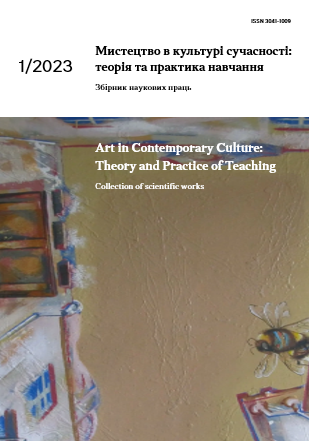Music therapy as a method of teaching and development of junior schoolchildren under martial law
Published 2023-10-30
Keywords
- musical art, methods of music therapy, educational process, younger schoolchildren, martial law
Copyright (c) 2023 Ірина Швець, Людмила Василевська-Скупа, Наталія Кравцова

This work is licensed under a Creative Commons Attribution 4.0 International License.
How to Cite
Abstract
The article discusses the ways of introducing methods of music therapy into the educational process of primary school. The essence and role of music therapy as an innovative health-saving technology for working with younger schoolchildren are defined. The article states that war, as the strongest stress factor, poses a real threat to the psychological and physical health of children. Psychological trauma caused by adverse environmental factors can negatively affect the reactions and intellectual development of children, lead to undesirable behavior, emotional instability, and depression. In the conditions of martial law, the school should become the resource place where the care of the child is based in the context of helping him adapt to the circumstances in which he or she finds himself. Today's challenges require improving the education and development of younger students through the use of health-saving approaches and methods.
It has been established that music therapy, being a component of psychological, pedagogical and psychotherapeutic methods, contributes to the preservation of mental health and the prevention of emotional disorders. It has a positive effect on a person's mood, on functional activity and performance, on his entire spiritual world.
A definition of the concept of «music therapy» has been proposed, taking into account different scientific views. The article presents a classification of methods of modern music therapy in relation to the patient's activity or type of training. It has been established that the methods of music therapy can be integrated into pedagogical concepts and actions containing musical, psychological and social processes of learning and development, since it opens up opportunities to take care of the child in a multifaceted way, taking into account all his/her characteristics, developmental needs and individual problems. It is noted that in order to optimize the process of personal development of the child, it is necessary to allow two areas to conduct a dialogue.
Music-therapeutic methods of instrumental, vocal, motor improvisation, performance of ready-made musical works, receptive listening to music are highlighted. A selection of musical works for work with younger students is presented. The effectiveness of the influence of music therapy methods as a non-verbal form of correction on the personality of a junior schoolchild is noted.
Downloads
References
- Беседа, Н. А. Здоров’язбережувальні технології як запорука ефективного навчання і виховання школярів: (тренінг для вчителів) ПостМетодика. 2010. № 1. С. 47-53
- Василевська-Скупа Л. П., Швець І. Б., Остапчук Л. О. Шляхи формування національної самосвідомості підростаючого покоління засобами українського музичного мистецтва. Наукові записки Центральноукраїнського державного педагогічного університету імені Володимира Винниченка. Серія: Педагогічні науки. 2022. Вип. 204. С. 99-103. https://doi.org/10.36550/2415-7988-2022-1-204-99-103
- Дячук, Н. І. Методи музикотерапії у навчально-виховному процесі початкової школи. Науковий часопис Національного педагогічного університету імені М. П. Драгоманова. Серія 14: Теорія і методика мистецької освіти : зб. наук. праць. Київ: Вид-во НПУ імені М. П. Драгоманова, 2011. Вип. 11 (16). С 252-255
- Кравцова Н. Музикотерапія. Психосоціальна підтримка публічних службовців в умовах воєнного стану: практикум для тренерів / Н. Алюшина, Ю. Жигуліна-Фаль, Н. Наулік та ін.; за заг. ред. проф. О. Редліха, С. Хаджирадєвої. Миколаїв: Ємельянова Т. В. 2022. 166 с.
- Калмикова Л. Казкотерапія в розвитку мовленнєвої діяльності дітей дошкільного віку / Л. Калмикова. http://www.nbuv.gov.ua/portal/soc_gum/gnvp/2010_4_SV2/8.pdf
- Кушнір К. В., Белінська Т. В., Білозерська Г. О. Використання інноваційних технологій навчання в контексті вивчення диригентсько-хорових дисциплін у вищій школі. Наукові записки ВДПУ імені Михайла Коцюбинського. Серія: педагогіка і психологія, випуск 63. 2020. С. 123-128
- Кушнір К. В., Клімішина І. А. Сучасні погляди на проблему формування музичної культури молодших школярів. Молодий вчений. № 1(53), січень, 2018. С. 808-810.
- Ростовський О. Я. Педагогіка музичного сприймання: навчально-методичний посібник. Київ: ІЗМН. 1997. 248 с.
- Сорока, О., Банкул Л. Музикотерапія як інноваційна здоров’язбережувальна технологія для роботи з молодшими школярами. Науковий вісник Ужгородського національного університету. Серія : Педагогіка. Соціальна робота. 2013. Вип. 27. С. 192-195.
- Hochreutener, S. L. Spiel – Musik – Therapie: Methoden der Musiktherapie mit Kindern und Jugendlichen (Praxis der Musiktherapie). Göttingen: Hogrefe Verlag; 1. Auflage 2009. 315 pages.
- Kraus, W. Die Heilkraft der Musik: Einführung in die Musiktherapie. München: Verlag C.H. Beck oHG. 1998. 235 s.
- Platzer, Julia. Musik als Bewältigungsstrategie in der Sozialpädagogik. Graz, 2014. 131 pages.
- Priestley, Mary. Music Therapy in Action. New York : St. Martin's Press. 1975. 274 pages.
- Schwabe, Christoph. Methodik der Musiktherapie und deren theoretische Grundlagen. Leipzig: J.A. Barth Verlag. 1986. 248 s.
- Spitzer, M. Musik im Kopf: Hören, Musizieren, Verstehen und Erleben im neuronalen Netzwerk. Schattauer; 10., Ndr. 2012 d. 1. Auflage 2005. 480 pages.
- Ster, Axel. Geschichte der Musiktherapie / Musikmedizin nach 1945 in Deutschland. In: Decker-Voigt, Hans-Helmut / Weymann, Eckhard (Hrsg.) : Lexikon Musiktherapie. 2009. 2- Aufl. Göttingen, Bern, Wien, Paris, Oxford, Prag, Toronto, Amsterdam, Kopenhagen, Stockholm: Hogrefe Verlag, S. 144-147.
- Wormit, A. F., Bardenheuer, H. J., Bolay, H. V. Aktueller Stand der Musiktherapie in Deutschland. In: Thomas Hillecke, Friedrich-Wilhelm Wilker (Gasthrsg.): Themenheft "Musiktherapie", Verhaltenstherapie & Verhaltensmedizin, 28. Jg., 1. 2007. Herausgegeben von Hans Reinecker et al. S.10-22.





